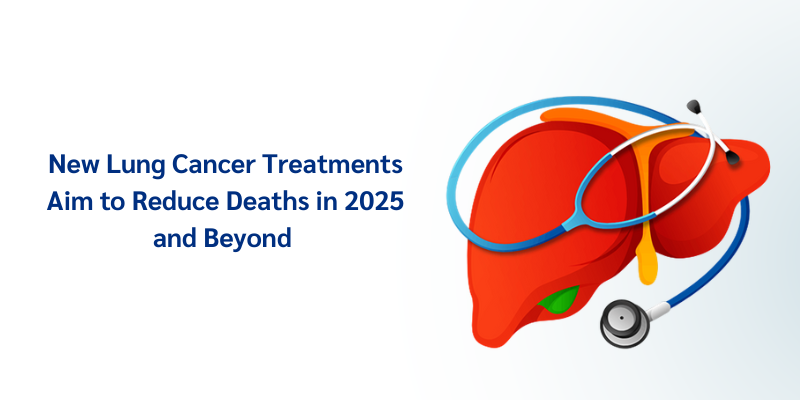Lung cancer remains one of the most challenging forms of cancer worldwide, causing millions of deaths every year. However, recent advancements are offering new hope. Researchers and oncologists are working tirelessly to develop innovative therapies that can improve survival rates and enhance the quality of life for patients. The best lung cancer treatment options are evolving, with a strong focus on personalized medicine, targeted therapies, and immunotherapy.
Breakthroughs in Lung Cancer Treatment
1 . Immunotherapy: Harnessing the Power of the Immune System
Immunotherapy has emerged as one of the most promising advancements in lung cancer treatment. It works by stimulating the body’s immune system to recognize and attack cancer cells. Checkpoint inhibitors such as pembrolizumab and nivolumab are helping patients with advanced lung cancer live longer with fewer side effects compared to traditional chemotherapy.
In Mumbai, leading cancer care centers are incorporating immunotherapy as part of their comprehensive lung cancer treatment programs. Patients who previously had limited options are now experiencing better survival outcomes with this innovative approach.
2. Targeted Therapy: Precision Medicine for Lung Cancer
Targeted therapy is revolutionizing lung cancer treatment by focusing on specific genetic mutations in cancer cells. Drugs like osimertinib, which targets EGFR mutations, and crizotinib, which targets ALK gene alterations, are showing significant success in controlling tumor growth. Unlike chemotherapy, targeted therapy is more precise and causes fewer side effects, making it one of the best lung cancer treatment options available today.
Mumbai has become a hub for advanced oncology care, offering world-class targeted therapy treatments. Patients seeking lung cancer treatment in Mumbai can now access cutting-edge genetic testing and precision medicine to tailor their treatment plans.
3. Liquid Biopsies: A Game-Changer in Early Detection
One of the biggest challenges in lung cancer treatment is early detection. Liquid biopsies, a non- invasive technique that detects cancer DNA in the blood, are set to transform how lung cancer is diagnosed and monitored. This breakthrough allows oncologists to detect mutations and adapt treatment strategies in real time, leading to better patient outcomes.
4. Combination Therapies: Maximizing Treatment Effectiveness
Recent studies show that combining different treatment modalities—such as chemotherapy with immunotherapy or targeted therapy—can significantly improve survival rates. These combination therapies are becoming the gold standard in advanced lung cancer treatment, providing patients with better control over the disease.
Leading hospitals and cancer centers offering lung cancer treatment in Mumbai are at the forefront of implementing these combination strategies, ensuring patients receive comprehensive and effective care.
5. AI and Personalized Medicine: The Future of Lung Cancer Treatment
Artificial Intelligence (AI) is playing a critical role in lung cancer treatment by analysing vast amounts of patient data to create personalized treatment plans. AI-driven diagnostic tools are helping doctors detect lung cancer at earlier stages, while machine learning algorithms are identifying the best lung cancer treatment plans tailored to individual patients.
In Mumbai, top oncology centres will soon be integrating AI into their diagnostic and treatment processes, ensuring patients receive state-of-the-art care tailored to their unique cancer profiles.

The Impact of New Treatments on Lung Cancer Survival Rates
The advancements in lung cancer treatment are translating into longer survival rates and improved quality of life for patients. In 2025 and beyond, with continued research and clinical trials, we can expect:
- Higher early detection rates due to improved screening techniques.
- More effective, less toxic treatments with fewer side effects.
- Increased survival rates due to personalized and precision medicine approaches.
- Better management of advanced lung cancer cases with combination therapies.
With ground-breaking advancements in immunotherapy, targeted therapy, and AI-driven personalized medicine, lung cancer treatment is evolving rapidly. For those seeking lung cancer treatment in Mumbai, the city offers world-class medical care, expert oncologists, and access to cutting-edge treatments. As research continues to progress, the hope for reducing lung cancer-related deaths in 2025 and beyond remains stronger than ever.
FAQs
1 . What is the best lung cancer treatment available today?
The best lung cancer treatment depends on the type and stage of cancer. Immunotherapy, targeted therapy, and combination treatments are currently the most effective options. Patients should consult with an oncologist to determine the best approach tailored to their condition.
2. Is lung cancer treatment in Mumbai affordable?
Mumbai offers a range of treatment options, from government hospitals to private cancer centers. Many hospitals provide cost-effective packages, and financial assistance programs along with insurance are available for eligible patients.
3. How does immunotherapy work for lung cancer?
Immunotherapy helps the immune system recognize and attack cancer cells. It has shown significant success in treating advanced lung cancer, especially when combined with other treatments.
4. What are the latest advancements in lung cancer detection?
Liquid biopsies and AI-driven diagnostic tools are making early lung cancer detection more accurate and less invasive, improving treatment outcomes.
5. Can lung cancer be cured?
Early-stage lung cancer has a higher chance of being cured, especially with surgery and advanced therapies. For advanced cases, the focus is on extending life expectancy and improving quality of life with the best lung cancer treatment options available.
* We strive to provide accurate and up-to-date information by relying on trusted and credible primary and secondary resources. However, we cannot guarantee the completeness or accuracy of the content. This content is intended for informational purposes only and does not constitute medical or professional advice. Always seek the guidance of a qualified healthcare provider or other relevant expert for advice tailored to your specific situation.

